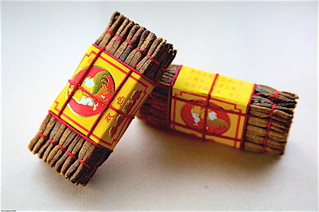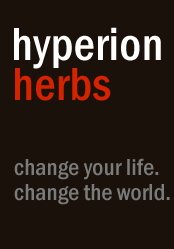|
The cordyceps fungus was revered by the Chinese emperors as a sex tonic.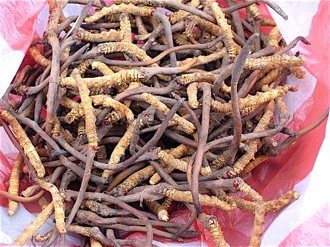
Holding a place among the world's most powerful adaptogenic herbs, the cordyceps fungus is a variety of mushroom that contains hundreds, if not thousands of species. The most widely used species for herbal medicinal purposes is cordyceps sinensis. Often referred to as the "club fungus" due to its clublike shape, this medicinal mushroom is called dong chong zia cao in Chinese, which literally translates as "summer-plant, winter worm". This name is due to the fact that the cordyceps fungus grows as a parasite out of the heads of bugs (each species targets a specific type of insect)! Any bug infected by the spores will be dead by the summer, hence the Chinese name. Traditional properties:~Sweet, acrid and bitter The cordyceps fungus was first discovered in the high plateaus and mountainous regions around Tibet and western China 1,500 years ago. Tibetan herdsmen noticed that their yaks were much livelier and vital when they ate from pastures where large groups of caterpillars had succumb to infestation from this mushroom and died in the grass. That being said, the vast majority of cordyceps on the market today are grown under laboratory conditions and are considered vegetarian since no insects are used as hosts. Codyceps sinensis is said to have the following properties: ~Increases endurance If you want to buy cordyceps sinensis for a great price and for the best quality available, this is a phenomenal source (click the text link below): Scientific properties:The cordyceps fungus has been the focus of an increasingly large body of research in recent years. Based on these clinical studies, cordyceps sinensis has been shown to be effective in treating chronic hepatic (liver) diseases, hypercholesterolemia, many aging disorders, renal (kidney) disorders, effective at increasing libido and various steroid hormones of youth, it has an anticancer effect, antiasthmatic effect, antioxidant effect and is immunomodulatory. The cordyceps fungus is considered a parasite since it infects and grows out of the heads of insects (which ends up killing them)! It should be noted that laboratory grown cordyceps don't require a insect host and are thus "vegetarian" friendly :) Watch this fascinating video below for some time lapse photography that shows how this unique mushroom grows. The endurance enhancing benefits of cordyceps sinensis has been utilized by many athletes to their utmost satisfaction. The entire Chinese Olympic team has been rumored to use cordyceps (and probably a variety of other Chinese tonic herbs!) to increase their edge. In the spring of 1993 eight Chinese female runners broke the 2:27 hour mark in the Tianjin marathon. This was an incredible achievement from just one nation. The following August it was Chinese women that won every single track distance event at the Stuttgart World Championships. A month later, again Chinese women dominated at the National Games in Beijing, breaking the records for the 1,500, 3,000 and 10,000 meter races. 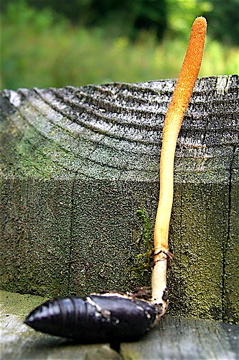
Interesting facts about cordyceps sinensis:In ancient China only emperors were allowed to use the cordyceps fungus because it was so scarce. The emperors of ancient China had a queen and often a very large harem of women that they had to satisfy and impregnate on a regular basis. Supplementing their diet with the cordyceps fungus allowed them to recover after long nights of hard work... as well as improve their sexual skill. The use of adaptogenic herbs in general can help men in increasing libido and to last longer sexually, however their use should really be combined with Taoist or tantric sexual practices that help develop the ability to withhold ejaculation (so as to not waste the energy that these anti-aging herbs build up in the body). Li Chih Shen, a famous sixteenth century Chinese herbalist, said that the cordyceps fungus was equivalent in its ability to tonify the body as Chinese ginseng was. Both of these adaptogenic herbs have traditionally been held in high esteem and have been so rare to come by that they are sold for quite a lot of money. Modern laboratory cultivation technologies have allowed for the cordyceps fungus to be able to be grown in controlled environments in large quantities. This has added a very affordable product to the market while simultaneously increasing it's medicinal power! When you choose to buy cordyceps, the traditional wildcrafted fungi can have unique properties about them that will never be able to be duplicated in a lab, however the wild mushrooms can cost as much as $600 for only 40 grams! Now with the laboratory grown cordyceps you can get 45 grams of an 8:1 (8x potency) extract for a mere $21. That's about $4,500 cheaper by weight!!! The lab grown mushrooms are also vegetarian and don't require an insect as its host. If you want to buy cordyceps sinensis for a great price and for the best quality available, this is a phenomenal source (click the text link below): Contraindications: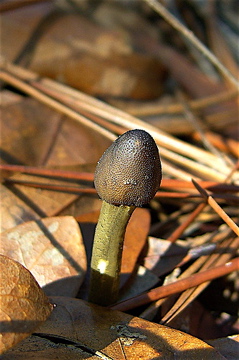
There aren't really any cordyceps side effects since it is such an effective panacea, except that it is said that one must take caution in taking this herbal adaptogen when there is an "external condition". In Chinese medicine this simply means any disease that affects the skin or muscles and isn't originating from an internal illness of the organs. This would mean that the cordyceps fungus should be avoided when a person is suffering from an illness such as chicken pox, a cold, the flu etc (these illnesses often have symptoms of a stiff muscles and/or skin rashes and originate from an external source in most cases). Of course the cordyceps fungus can be a great help in rebuilding the body and immune system after these illnesses have passed. The "American Herbal Product Association's Botanical Safety Handbook" suggests that there aren't any cordyceps side effects during pregnancy and that women don't need to restrict themselves from using this anti-aging herb. However, research needs to be done specifically to determine if there is any cause for concern and it might be wise to avoid using it whilst bearing a child. It has been traditionally used post-pregnancy to help rebuild and tonify a woman's entire physiology, so it could be assumed to be safe and even highly recommended for use during lactation. Sources: ~"Chinese Tonic Herbs" by Ron Teeguarden (Japan Publications, 1984) Click to return from "Cordyceps Fungus" to the "Adaptogenic Herbs" page. |





